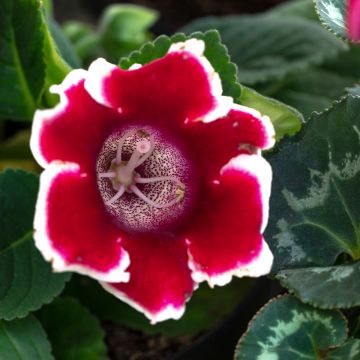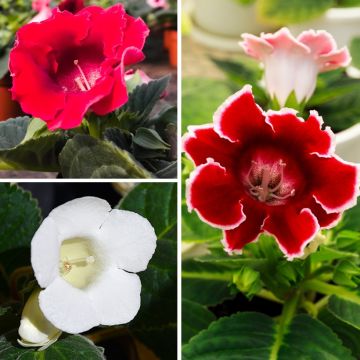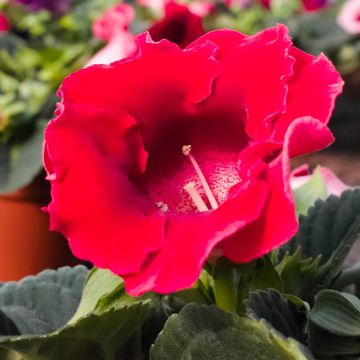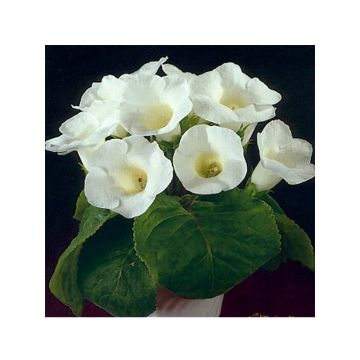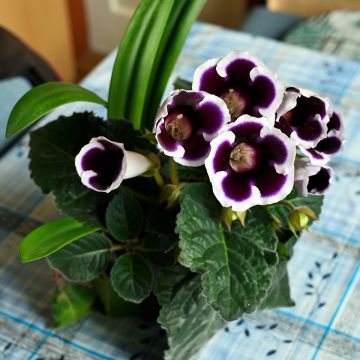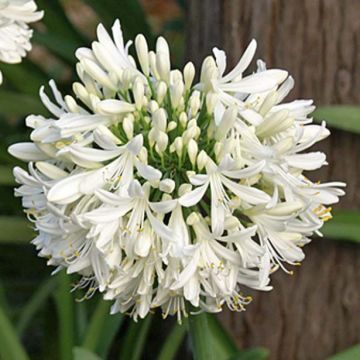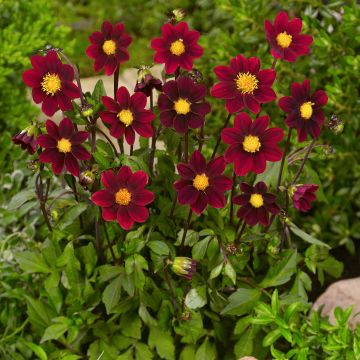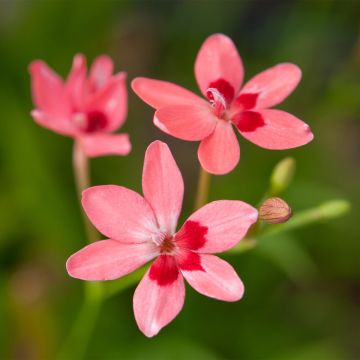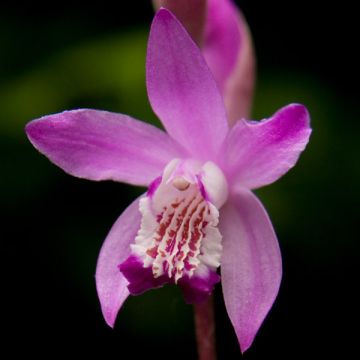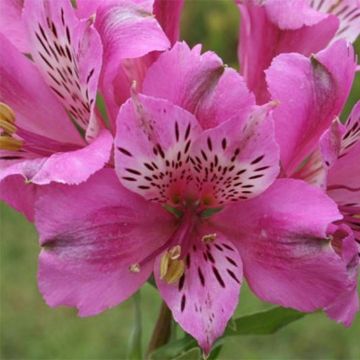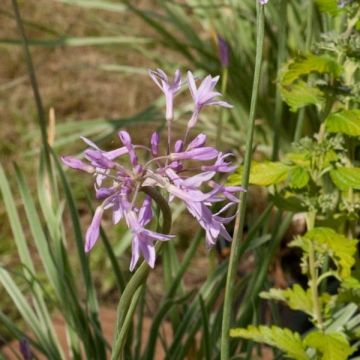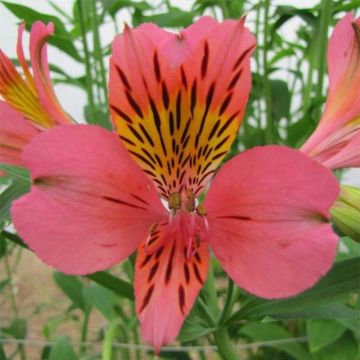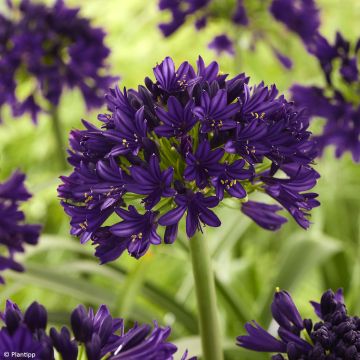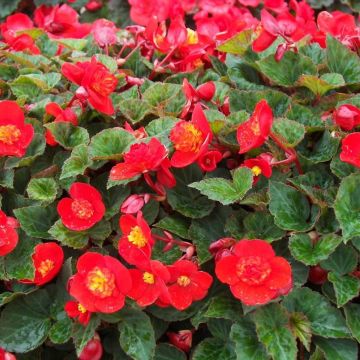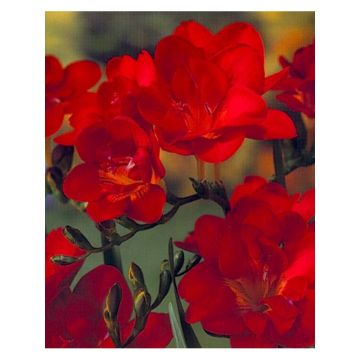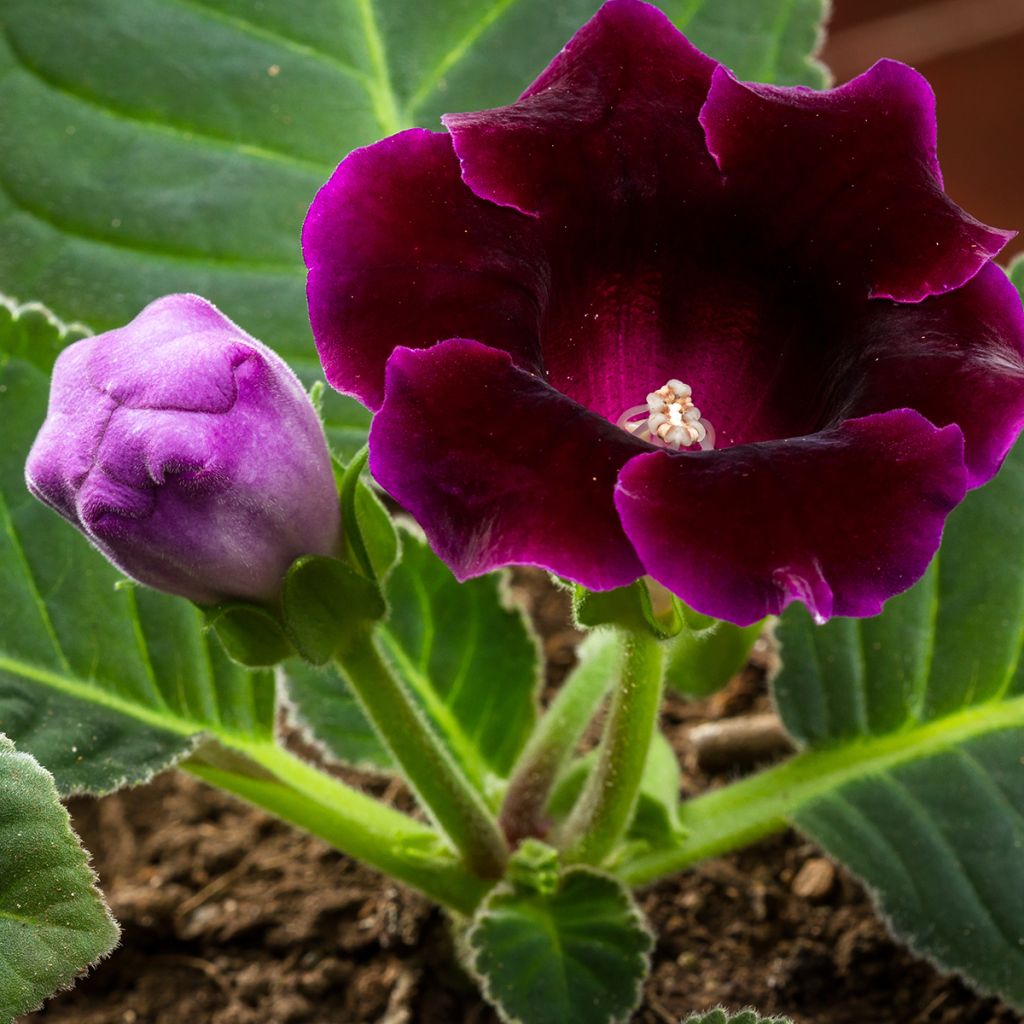

Gloxinia speciosa Violacea
Gloxinia speciosa Violacea
Gloxinia speciosa Violacea
Florist's Gloxinia, Painted tongue, Showy Gloxinia, Brazilian Gloxinia
Why not try an alternative variety in stock?
View all →This plant carries a 6 months recovery warranty
More information
We guarantee the quality of our plants for a full growing cycle, and will replace at our expense any plant that fails to recover under normal climatic and planting conditions.
From €5.90 for pickup delivery and €6.90 for home delivery
Express home delivery from €8.90.
Does this plant fit my garden?
Set up your Plantfit profile →
Description
Gloxinia 'Violacea' bears charming deep purple bell-shaped velvety flowers, rich in black and brown reflections. They cluster on dark green velvety foliage for much of the summer. This tuberous perennial is easy to grow. It is spectacular in the house, or on a windowsill, in partial shade and protected from direct sunlight.
Gloxinia speciosa, also known as Sinningia speciosa, belongs to the Gesneriaceae family and is native to Brazil. Since the 19th century, this tuberous and frost-sensitive perennial plant has given rise to numerous cultivars that have become exceptional indoor plants. The 'Violacea' cultivar produces plants that do not exceed 30 to 35cm (12 to 14in) in all directions. The bell-shaped velvety flowers appear in spring in the axils of the leaves. They bloom throughout summer. They can reach 8cm (3in) in diameter. They are carried by short peduncles and are dark violet, blooming around a very dark throat. The small heart of the flower is white with dark speckles. These flowers open on a cluster of dark green, wide, oval to oblong-shaped, fleshy and velvety leaves. Their veins are visible and their margins are serrated. They dry up in autumn and disappear with the arrival of cool temperatures. Only the round and flattened tubers persist in the soil, which should be kept dry until the start of vegetation in spring.
Gloxinias are stunning indoor plants. They are sturdy and easy to overwinter in a dry environment. Few plants can claim such a theatrical appearance, and it is sometimes difficult, if not impossible, to place them with other plants. They are stunning in flower boxes and on windowsills, protected from direct sunlight. They are perfect for replacing geraniums where there is a lack of sunlight.
Report an error about the product description
Plant habit
Flowering
Foliage
Botanical data
Gloxinia
speciosa
Violacea
Gesneriaceae
Florist's Gloxinia, Painted tongue, Showy Gloxinia, Brazilian Gloxinia
Cultivar or hybrid
Other Gloxinias
Planting and care
It is a frost-sensitive plant. It thrives at an ideal temperature of around 21°C (69.8°F) in summer, which is why it is easy to grow indoors. This same temperature should be provided in spring for growth to resume.
You can take it outside as soon as it is warm enough. It is sensitive to high temperatures that dry out the atmosphere. It needs light to flourish, without being exposed to direct sunlight, especially in summer. This plant likes humid atmospheres and partial shade. If you cultivate this plant indoors, it is useful to spray water on the leaves (not the flowers, as this would be damaging) or place it on a bed of clay balls or stones in a tray filled with water.
Water twice a week or more during flowering, then gradually decrease it before stopping completely when the foliage disappears and the rhizome enters dormancy. Weekly fertilisation with the watering water is beneficial in summer to support flowering.
When the aboveground parts have withered, store the pot in a dry and warm place (15°C (59°F)) until the following spring, when you will repot it in rich and light potting soil.
Planting period
Intended location
Care
This item has not been reviewed yet - be the first to leave a review about it.
Bulbs to grow in pots
Haven't found what you were looking for?
Hardiness is the lowest winter temperature a plant can endure without suffering serious damage or even dying. However, hardiness is affected by location (a sheltered area, such as a patio), protection (winter cover) and soil type (hardiness is improved by well-drained soil).

Photo Sharing Terms & Conditions
In order to encourage gardeners to interact and share their experiences, Promesse de fleurs offers various media enabling content to be uploaded onto its Site - in particular via the ‘Photo sharing’ module.
The User agrees to refrain from:
- Posting any content that is illegal, prejudicial, insulting, racist, inciteful to hatred, revisionist, contrary to public decency, that infringes on privacy or on the privacy rights of third parties, in particular the publicity rights of persons and goods, intellectual property rights, or the right to privacy.
- Submitting content on behalf of a third party;
- Impersonate the identity of a third party and/or publish any personal information about a third party;
In general, the User undertakes to refrain from any unethical behaviour.
All Content (in particular text, comments, files, images, photos, videos, creative works, etc.), which may be subject to property or intellectual property rights, image or other private rights, shall remain the property of the User, subject to the limited rights granted by the terms of the licence granted by Promesse de fleurs as stated below. Users are at liberty to publish or not to publish such Content on the Site, notably via the ‘Photo Sharing’ facility, and accept that this Content shall be made public and freely accessible, notably on the Internet.
Users further acknowledge, undertake to have ,and guarantee that they hold all necessary rights and permissions to publish such material on the Site, in particular with regard to the legislation in force pertaining to any privacy, property, intellectual property, image, or contractual rights, or rights of any other nature. By publishing such Content on the Site, Users acknowledge accepting full liability as publishers of the Content within the meaning of the law, and grant Promesse de fleurs, free of charge, an inclusive, worldwide licence for the said Content for the entire duration of its publication, including all reproduction, representation, up/downloading, displaying, performing, transmission, and storage rights.
Users also grant permission for their name to be linked to the Content and accept that this link may not always be made available.
By engaging in posting material, Users consent to their Content becoming automatically accessible on the Internet, in particular on other sites and/or blogs and/or web pages of the Promesse de fleurs site, including in particular social pages and the Promesse de fleurs catalogue.
Users may secure the removal of entrusted content free of charge by issuing a simple request via our contact form.
The flowering period indicated on our website applies to countries and regions located in USDA zone 8 (France, the United Kingdom, Ireland, the Netherlands, etc.)
It will vary according to where you live:
- In zones 9 to 10 (Italy, Spain, Greece, etc.), flowering will occur about 2 to 4 weeks earlier.
- In zones 6 to 7 (Germany, Poland, Slovenia, and lower mountainous regions), flowering will be delayed by 2 to 3 weeks.
- In zone 5 (Central Europe, Scandinavia), blooming will be delayed by 3 to 5 weeks.
In temperate climates, pruning of spring-flowering shrubs (forsythia, spireas, etc.) should be done just after flowering.
Pruning of summer-flowering shrubs (Indian Lilac, Perovskia, etc.) can be done in winter or spring.
In cold regions as well as with frost-sensitive plants, avoid pruning too early when severe frosts may still occur.
The planting period indicated on our website applies to countries and regions located in USDA zone 8 (France, United Kingdom, Ireland, Netherlands).
It will vary according to where you live:
- In Mediterranean zones (Marseille, Madrid, Milan, etc.), autumn and winter are the best planting periods.
- In continental zones (Strasbourg, Munich, Vienna, etc.), delay planting by 2 to 3 weeks in spring and bring it forward by 2 to 4 weeks in autumn.
- In mountainous regions (the Alps, Pyrenees, Carpathians, etc.), it is best to plant in late spring (May-June) or late summer (August-September).
The harvesting period indicated on our website applies to countries and regions in USDA zone 8 (France, England, Ireland, the Netherlands).
In colder areas (Scandinavia, Poland, Austria...) fruit and vegetable harvests are likely to be delayed by 3-4 weeks.
In warmer areas (Italy, Spain, Greece, etc.), harvesting will probably take place earlier, depending on weather conditions.
The sowing periods indicated on our website apply to countries and regions within USDA Zone 8 (France, UK, Ireland, Netherlands).
In colder areas (Scandinavia, Poland, Austria...), delay any outdoor sowing by 3-4 weeks, or sow under glass.
In warmer climes (Italy, Spain, Greece, etc.), bring outdoor sowing forward by a few weeks.

































